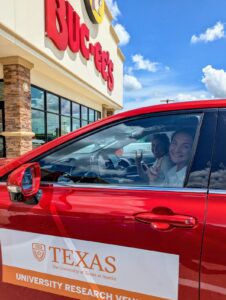Science
Hydrogen-Powered Vehicles Successfully Complete 365-Mile Texas Journey

In a significant demonstration of progress in hydrogen technology, a caravan of hydrogen fuel cell vehicles successfully completed a 365-mile round trip from Austin to Houston, Texas. This event coincided with the Hydrogen Technology Expo, showcasing the potential of hydrogen as an alternative energy source. The journey, undertaken by students and staff from the University of Texas at Austin’s Center for Electromechanics (CEM), reflects the state’s growing role as a global hub for hydrogen energy.
The fleet, composed of Toyota Mirai vehicles, embarked on this journey without the need for a police escort, a stark contrast to a similar expedition conducted in 2003 in California. At that time, safety concerns surrounded hydrogen technology. Alan Lloyd, a prominent figure in hydrogen research, participated in both events, highlighting the evolution of the technology over the past two decades. “We drove effortlessly and smoothly along Highway 290,” Lloyd stated. “Seeing what we had started 20 years ago in California manifest on Texas roads is satisfying.”
The team returned to Austin with a quarter of a tank remaining, achieving an impressive average fuel economy equivalent to 85 miles per gallon. This trip not only underscores the advancements in hydrogen fuel technology but also marks 20 years of innovation at CEM, which has been pivotal in researching and developing hydrogen solutions.
Introducing the Hydrogen ProtoHub
In April 2024, UT CEM inaugurated the Hydrogen ProtoHub at the J.J. Pickle Research Campus, a pioneering facility designed to support hydrogen technology development. This facility features on-site hydrogen generation, storage, distribution, and a vehicle fueling station, effectively demonstrating the entire hydrogen ecosystem. Mike Lewis, director of CEM, emphasized its broader impact, noting, “We are looking to help meet the power demands of AI and data centers.”
The facility also plays an essential role in educating the next generation of engineers. It provides a hands-on learning experience for students to apply theoretical concepts in real-world scenarios. The Hydrogen ProtoHub is currently the only publicly available hydrogen fueling station in Texas, addressing a significant gap in the state’s hydrogen infrastructure.
The recent road trip to Houston utilized three Toyota Mirais, showcasing their capabilities in a practical setting. Grace Childers, a senior chemical engineering student and research assistant, drove one of the vehicles on this trip. She explained the fueling process, noting the similarity to traditional combustion engines, while highlighting the environmental benefits: “The only emission is water vapor.”
Overcoming Infrastructure Challenges
Despite the success of the trip, challenges remain regarding hydrogen infrastructure across Texas. Currently, the state lacks a comprehensive network of hydrogen fueling stations, which can create range anxiety for drivers of hydrogen vehicles. According to Austin Mabrey, a research engineer at CEM, “The range anxiety is real, partially caused by the Toyota Mirai displaying a conservative value for miles to empty.” To mitigate this concern, the team drove conservatively and monitored fuel levels closely, ensuring a safe return.
The journey also represents a pivotal moment for hydrogen integration in Texas. The North Central Texas Council of Governments has recently received a federal grant aimed at establishing a hydrogen fueling station network, enhancing accessibility for future hydrogen fuel cell vehicle users. Additionally, the HyVelocity Hydrogen Hub initiative is set to support hydrogen production and distribution projects along the Texas Gulf Coast, further advancing the state’s hydrogen capabilities.
As the team reflects on their recent experiences, they remain committed to proving the viability of hydrogen vehicles in Texas. Childers expressed her enthusiasm for the opportunity to work with hydrogen technology, emphasizing its importance for her future career: “Getting to work on hydrogen technology in such a practical sense has confirmed that I would love to stay in the energy industry somehow.”
The successful completion of this road trip not only demonstrates the advancements in hydrogen technology but also highlights the ongoing efforts to build the necessary infrastructure for its widespread adoption. As Texas takes strides toward becoming a leader in hydrogen energy, the collaboration between academia and industry will be crucial in shaping the future of transportation and energy in the state.
-

 Lifestyle3 months ago
Lifestyle3 months agoLibraries Challenge Rising E-Book Costs Amid Growing Demand
-

 Sports3 months ago
Sports3 months agoTyreek Hill Responds to Tua Tagovailoa’s Comments on Team Dynamics
-

 Sports3 months ago
Sports3 months agoLiverpool Secures Agreement to Sign Young Striker Will Wright
-

 Lifestyle3 months ago
Lifestyle3 months agoSave Your Split Tomatoes: Expert Tips for Gardeners
-

 Lifestyle3 months ago
Lifestyle3 months agoPrincess Beatrice’s Daughter Athena Joins Siblings at London Parade
-

 World2 months ago
World2 months agoWinter Storms Lash New South Wales with Snow, Flood Risks
-

 Science3 months ago
Science3 months agoTrump Administration Moves to Repeal Key Climate Regulation
-

 Business3 months ago
Business3 months agoSoFi Technologies Shares Slip 2% Following Insider Stock Sale
-

 Science3 months ago
Science3 months agoNew Tool Reveals Link Between Horse Coat Condition and Parasites
-

 Science2 months ago
Science2 months agoSan Francisco Hosts Unique Contest to Identify “Performative Males”
-

 Sports3 months ago
Sports3 months agoElon Musk Sculpture Travels From Utah to Yosemite National Park
-

 Science3 months ago
Science3 months agoNew Study Confirms Humans Transported Stonehenge Bluestones








